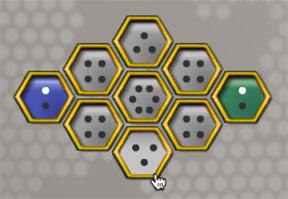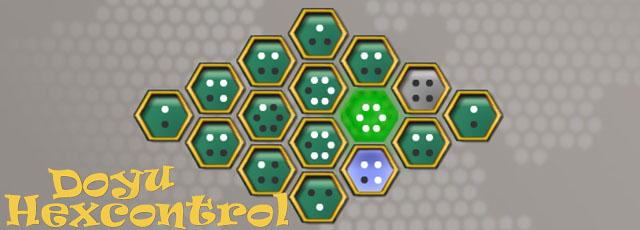![]() Sometimes a simple puzzle game gets under your skin and challenges what you know. It's why we love tonypa... his games are unexpected, they make you think, and yet they are excessively simple in design. Welcome to the party Doyu Hexcontrol by Doyu Games, a game that's is easy to figure out and challenging to master, to say the least. Built on a hexagonal grid, you and the computer or another player take turns making moves. First you place your color on the board, and then you can either take another space, or fill one of the dots in the space you've chosen. Each space has 2, 3, 4 or 6 die-like dots, which are a part of the strategy. As soon as you fill the dots in a hexagon, it explodes, conquering all the spaces around it. As you take over a new hexagon, you automatically get one more dot than was in that space to begin with. So, if the space is empty, you receive one dot; If it has one or more, whether your color or your opponent's, you gain one more than it held before.
Sometimes a simple puzzle game gets under your skin and challenges what you know. It's why we love tonypa... his games are unexpected, they make you think, and yet they are excessively simple in design. Welcome to the party Doyu Hexcontrol by Doyu Games, a game that's is easy to figure out and challenging to master, to say the least. Built on a hexagonal grid, you and the computer or another player take turns making moves. First you place your color on the board, and then you can either take another space, or fill one of the dots in the space you've chosen. Each space has 2, 3, 4 or 6 die-like dots, which are a part of the strategy. As soon as you fill the dots in a hexagon, it explodes, conquering all the spaces around it. As you take over a new hexagon, you automatically get one more dot than was in that space to begin with. So, if the space is empty, you receive one dot; If it has one or more, whether your color or your opponent's, you gain one more than it held before.
 And that's where the heart of the strategy comes into play. If you set up a chain of explosions, you can take over a large portion of the board. You can also leave yourself open to a chain-reaction of explosions from your opponent if you don't watch your dot placement. Like chess and other multi-layered strategy games, you always have to look ahead as many plays as you can to determine both the best placement of new hexagons as well as how many dots to place in each one. And once you get past the Easy levels, you'll find that the AI won't always follow a standard set of plays. The blue and green are similar in hue so color blind players may have some issues, and we hope to hear from you if that is the case. Beyond that, it's a well-designed game with infinite replay value. Put on your thinking cap... you're going to need it for this one!
And that's where the heart of the strategy comes into play. If you set up a chain of explosions, you can take over a large portion of the board. You can also leave yourself open to a chain-reaction of explosions from your opponent if you don't watch your dot placement. Like chess and other multi-layered strategy games, you always have to look ahead as many plays as you can to determine both the best placement of new hexagons as well as how many dots to place in each one. And once you get past the Easy levels, you'll find that the AI won't always follow a standard set of plays. The blue and green are similar in hue so color blind players may have some issues, and we hope to hear from you if that is the case. Beyond that, it's a well-designed game with infinite replay value. Put on your thinking cap... you're going to need it for this one!






This game could have done with some in-game basic instructions on how to play.
I started to play like it was a Hex Logic game (see: https://play.google.com/store/apps/details?id=com.gabysoft.hexlogiczoo)
You CAN click on the same hexagon more than once, just in case you didn't know.
The game does have some VERY basic instructions, but I didn't find them until I had had already figured it out on my own. I enjoy the element of discovery in games so much, that I tend to err on the side of giving as little information as possible, while still trying to fill in any gaps that might exist in a tutorial or instructions. It's a fine line!
I'm like that too. After all, basic controls such as "use WASD to move" are often worked into the first couple of levels, especially if it gets any more complex than that (such as shooting or one of the many shape/character-shifting platformer games).
I found the "Instructions" button back at the main menu, but it wasn't very obvious.
Because of that, I got kind of frustrated. Suppose it's because I'd rather play some kind of logic puzzle than some kind of strategy game.
Since it's a game without any randomness, one of the 2 players is forced to win should he play perfectly, see http://en.wikipedia.org/wiki/Solved_game to see what I mean. A software that calculate this shouldn't be so hard to make, it may have been done already, I wonder what the result is.
I remember seeing a game very similar to this a long time ago, but it was played on a square grid with an isometric view, you played by stacking tiles on the squares, and the edge/corner squares were slightly raised to illustrate that they took fewer tiles to "overflow".
Seeing it in a hex-grid form is a nice change.
@zzzzz The fact that the game has a theoretical "perfect play" doesn't mean that much. For larger boards it becomes infeasible to compute every possible sequence of moves by brute force, since the number of such sequences grows roughly exponentially with board size.
In other words, knowing that a solution exists is not the same as being able to compute it.
Well I think it's easy to code what there is to calculate, the biggest one probably need centuries to get the solution though, maybe the smallest requires only some weeks I don't know, I was just saying.
zzzzz with your argument chess should have been perfectly solved already, yet computer engineers work since decades on chess AI.
About this game, I bet the AI on "hard" on a small board the second time I ever played this game. So kinda anticlimactic.
No it shouldn't, like I said, by using bruteforce it can take centuries to solve games which allow many actions each turn.
By the way, in hard on the biggest board the computer wasn't a good looser against me and decided to stop playing all of sudden.
zzzzz its not only time, which are certainly not only centuries when using all computers of the earth on that task anyway. It is also about memory, you need to store all calculated positions somewhere.
To give you perspective. there 10^45 legal chess positions. Thats aprox 9×10^35 Terabyte of memory. Using 4 terabyte harddrives, that are aprox. 2*10^35 harddrives. Each weighing 690g (hitatchi ultrastar) that are aprox 10^32 tons. Earth having the mass of 6*10^21 tons. Thats the mass of 26 millions of earths.
An interesting open question to humanity is, if both players play perfectly, is it a draw or is white going to win?
Update